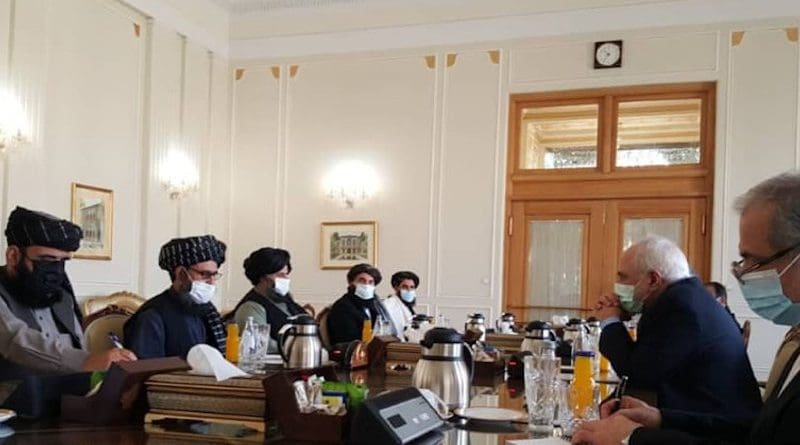Warming Iran-Taliban Ties To Have Consequences For Region – OpEd
By Arab News
By Zaid M. Belbagi *
On a hot day in August 1998, the Taliban conquered Mazar-e-Sharif, the holy city believed by some to be the final resting place of Caliph Ali bin Abi Taleb. The conquest was described as a frenzied takeover, as Taliban fighters shot at “anything that moved,” killing hundreds of Hazara Shiites, along with eight Iranian officials at Tehran’s consulate in the city and an Iranian journalist.
The massacre, as it became known, was in stark contrast to the Taliban’s conquest of Kabul last month, when they were keen to proclaim an “open and inclusive” government that will represent Afghans of all ethnic groups. Appointing a Hazara commander to their ranks, the Taliban have shown a readiness to placate Iran, suggesting the potential for a new axis to develop in an already troubled region.
The commonly understood perception of the Taliban is that the US and Pakistan’s Inter-Services Intelligence played a disproportionate role in their inception. This narrative states that both parties encouraged and endorsed radical elements from the anti-Soviet mujahideen, from where the Taliban emerged. However, such talk dissipated as the Taliban prepared themselves as a government-in-waiting and then took control of Afghanistan in the blink of an eye.
The defeat of the last bastion of opposition in Panjshir last week has led many to disparage the role of Pakistan in supporting the Taliban. A recent meeting between the ISI chief and Taliban leader Mullah Abdul Ghani Baradar was considered to be a key moment in signaling the re-engagement of Islamabad in the affairs of its neighbor. However, this oversimplification does little to explain the complexity of the Taliban and its new alliance structures, as other powers like Iran and China show themselves to be similarly central to the group’s agenda.
One of the most interesting developments concerning the situation in Afghanistan that has been almost entirely overlooked is the Taliban-Iran axis taking hold. Without a doubt, the hurried US withdrawal has led to a vacuum, with this newly media-savvy and refreshed iteration of the Taliban showing an openness to erstwhile enemies. Among these, Iran, which had held heretical status among the militants, has shown itself to be a key partner. Relations are a world away from when the Islamic Revolutionary Guard Corps supported US forces in their 2001 invasion.
The reality is Iran has spent a decade preparing for the Taliban’s eventual takeover and the once-mortal enemies have collaborated closely. The IRGC has worked with the Taliban for several years in its fight against Daesh-Khorasan. Quds Force commander Brig. Gen. Esmail Ghaani, who is an old Afghan hand himself, showed a willingness to involve himself in the militants’ affairs in the months leading up to their conquest. And Iran’s then-Foreign Minister Javad Zarif hosted the Taliban in Tehran for a meeting with envoys of the US-backed Kabul government weeks before their takeover.
According to Kamal Alam, an Afghanistan-Pakistan security expert, the Taliban’s Iran ties are deep-rooted. He said: “Whilst Qassem Soleimani dealt with the Arab world, Esmail forged closer links with the Taliban. By giving military and financial support to the Taliban, he changed Iran’s position toward them. This has been detailed in US intelligence assessments on the ground prior to their departure.”
This development — which comes while the international community is concerned with Iran’s enrichment of uranium toward nuclear weapon-grade and in circumstances where the US has shown itself to be lukewarm toward regional security — is incredibly troubling. In a manner not dissimilar to how the implosion of Iraq emboldened Iran, the situation in Afghanistan provides another opportunity for Tehran to extend its writ and geopolitical influence.
The involvement of foreign powers is especially concerning, particularly as and when Taliban failures of governance cause a splintering of the country. The development of an IRGC-Taliban front is one of the many unexpected developments stemming from America’s failure in Afghanistan — the “graveyard of empires.” The only positive to stem from the new-found friendship is that the Taliban have also started showing tolerance toward the country’s long-persecuted Shiite population. Upon taking Kabul, they publicly announced that all Shiites would be safe and need not fear. Nevertheless, Tehran showing its hand in Kabul is likely to be problematic, not least to Pakistan, which will be concerned that the Taliban will no longer act as a conduit for its interests.
- Zaid M. Belbagi is a political commentator, and an adviser to private clients between London and the Gulf Cooperation Council (GCC). Twitter: @Moulay_Zaid

